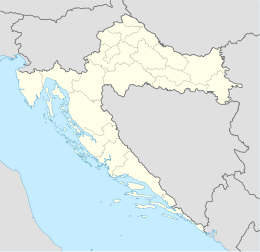Prvić (pronounced [pr̩̂v̞itɕ]; Italian: Provicchio) is a small island in the Croatian part of the Adriatic Sea. It is situated in the Šibenik archipelago, about half a mile from the mainland, in the vicinity of Vodice. The whole island is under protection of the Croatian Ministry of Culture since the island is considered a cultural heritage.
 | |
| Geography | |
|---|---|
| Location | Adriatic Sea |
| Coordinates | 43°43′48″N 15°47′42″E / 43.73000°N 15.79500°E |
| Archipelago | Šibenik archipelago |
| Area | 2.37 km2 (0.92 sq mi) |
| Length | 3.1 km (1.93 mi) |
| Width | 1.35 km (0.839 mi) |
| Coastline | 10.63 km (6.605 mi) |
| Highest elevation | 79 m (259 ft) |
| Highest point | Vitković |
| Administration | |
| Counties | Šibenik-Knin County |
| Demographics | |
| Population | 403 (2011) |
| Pop. density | 147.61/km2 (382.31/sq mi) |
History
editThe name of the island was possibly derived from ancient Greek Proteras, from which could have been Prvin, the name of the pre-Christian Croatian god of spring.[1] The other theory says that the name derives from the fact that Prvić is first ("prvi") island from the mainland in the Šibenik archipelago.
In 14th and 15th century the island belonged to noble families from Šibenik. During Ottoman conquests in 16th and 17th century, the island was inhabited by refugees from the mainland.
During World War II many of the inhabitants of the island joined the antifascist movement. Prvić was highly important in defending region against the Nazi occupation. There are many antifascist monuments on the island.
Economy
editPrvić's main industries are agriculture (grapes, olives and figs), fishing and tourism. The sea around Prvić is quite rich with fish. Inhabitants of Prvić are known for making tasty and healthy olive oil and good wine. As mentioned, they often go fishing as well. Therefore, Mediterranean cuisine, especially Dalmatian, is common.
Tourism
editTourism is the most important economic branch on the island. There is just one hotel on the island, Hotel Maestral in Prvić Luka, but locals rent their apartments, houses and villas for tourists.
Culture
editThere are four Roman Catholic churches on the island. Two in Šepurine and two in Prvić Luka. The smaller church in Šepurine was built in medieval times, and the bigger one in the 19th century. There are many cultural events on the island during the year, such as; music concerts, art exhibitions, many sport competitions and others.
Every year on August 2 there is a local celebration in Prvić Luka, and on August 16 the fešta is in Šepurine.
Villages
editThere are two villages on the island:
- Prvić Luka and
- Šepurine.
The islands total area is 2.37 km2 and has a population of 403 (as of 2011[update][2]). Prvić is the third most densely populated island in Croatia.[1] Šepurine is located on the west side of the island opposite Vodice. Prvić Luka is situated in the biggest bay on the southeast side and it is well protected from the northern and western winds.[1]
Interesting facts
edit- Famous Croatian[3] bishop, inventor and polymath Faust Vrančić is buried in a church in Prvić Luka.
- In Šepurine the Faust Vrančić family had a large baroque-style summer residence which is now in the possession of the Draganić family.
- Servant of God Ante Antić (hr) was born in Šepurine.
- There are no cars on the whole island, except a fire truck. There are a few tractors and bicycles.
- Many ancient and medieval artifacts were found on the island.
- The coastline of the island is 10.6 km (6.6 miles) long.
See also
editReferences
editThis article needs additional citations for verification. (March 2014) |
- ^ a b c Article about Prvić on web site of local hotel Archived December 3, 2005, at the Wayback Machine
- ^ Ostroški, Ljiljana, ed. (December 2015). Statistički ljetopis Republike Hrvatske 2015 [Statistical Yearbook of the Republic of Croatia 2015] (PDF). Statistical Yearbook of the Republic of Croatia (in Croatian and English). Vol. 47. Zagreb: Croatian Bureau of Statistics. p. 47. ISSN 1333-3305. Retrieved 27 December 2015.
- ^ Library and Waleson, John Crerar and Anthea (1984). Nature disclosed: books from the collections of the John Crerar Library illustrating the history of science. University of Chicago Library. p. 17. ISBN 978-0-943056-03-6.
